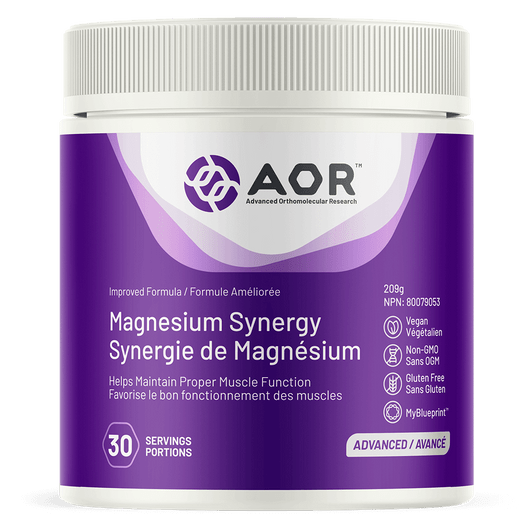Description
Aor Magnesium Synergy Powder 209 g:
Helps maintain proper muscle function; Helps in energy production and metabolism.
Magnesium Synergy is specially formulated to promote optimal absorption of magnesium into the cell, where it is needed the most, without negative side effects at therapeutic doses. This formulation helps in energy metabolism and tissue and connective tissue formation and provides electrolytes for the maintenance of good health while providing support for healthy glucose metabolism and the maintenance of healthy skin and immune function.
Magnesium Synergy is a factor in the maintenance of good health, helps the body metabolize nutrients and in the development and maintenance of cartilage, bones, and teeth. It is a source of antioxidants that helps to fight, protect cells against and reduce the oxidative effect of the oxidative damage caused by free radicals.
Magnesium Deficiency: Deficiencies are highly common, despite the abundance of magnesium available in green leafy vegetables, grains, legumes, nuts, and seeds. This may be due to the prevalence of processed food consumption, as refining food depletes its magnesium content by up to 85%. Chronic fatigue, weakness, irritability, muscle stiffness, and mood imbalances are signs indicative of deficiency. Other factors that contribute to magnesium deficiency include certain medications, Crohn’s disease, IBS and celiac disease. Type 2 diabetics may have increased urinary magnesium excretion. Older adults may also be at increased risk for deficiency due to age-related changes in gastrointestinal physiology. Magnesium absorption is also impaired by excessive alcohol, salt and coffee consumption, profuse sweating, prolonged or intense stress, and chronic diarrhea.
Magnesium has been extensively studied, and the literature demonstrates a link between magnesium deficiency and many degenerative diseases. A majority of research indicates that magnesium reduces heart disease risk, high blood pressure, risk of diabetes and stroke, increases energy production, exercise tolerance, bone mineral density and can manage pain and migraines. The following section focuses on why magnesium is crucial.
Magnesium & Bone Health: Magnesium is required for bone mineralization and bone metabolism. It influences the activities of key bone cells, osteoblasts (bone building cells) and osteoclasts (bone destroying cells). Magnesium also affects the concentrations of both parathyroid hormone and the active form of vitamin D, which are major regulators of bone homeostasis. Numerous studies have found positive associations between magnesium intake and bone mineral density in both men and women.
Magnesium & Cardiovascular Health: Studies indicate that high magnesium intake is associated with a low prevalence of cardiovascular events due to its role in managing blood sugar and blood pressure. Magnesium relaxes and maintains the normal structure of blood vessels and balances electrolytes which are necessary for the maintenance of normal blood pressure. In the six-year Atherosclerosis Risk in Communities (ARIC) study of 7,731 individuals, the risk of developing high blood pressure was reduced as blood magnesium levels increased. In a randomized, double-blind, placebo-controlled, human study, daily consumption of 638 mg of magnesium for three months, improved beta-cell function and resulted in lower blood glucose. Magnesium is also considered a “natural calcium channel blocker”; it helps regulate the amount of calcium in the blood and cells, to prevent hyper-excitability and assists in keeping the blood vessels clear.
Magnesium & Mental Health: Magnesium is involved in regulating the excitability of the central nervous system, relaxing muscles and regulating neuronal nitric oxide production. It has been hypothesized that magnesium deficiency is a cause of many major mental health disorders. In a state of deficiency, the brain can become hyperactive and lead to alterations in mood and cause irritability and aggressive behaviour. Magnesium is considered to be one of the most critical minerals for mood regulation.
The Different Forms of Magnesium: Various forms of magnesium are available and can make a huge difference in how the mineral is absorbed and its therapeutic effects. For example, magnesium oxide is not well absorbed and can have a laxative effect while magnesium glycinate or malate are much better tolerated and absorbed plus they have additional health benefits since they also contain beneficial amino acids
Magnesium glycinate: Glycine is well known calming amino acid. This combination has good bioavailability and it does not have a laxative effect since glycine is actively transported through the intestinal wall. Due to the calming and relaxing effect of both glycine and magnesium this combination has been used successfully for chronic pain and muscle hypertonicity.
Magnesium Malate: The combination of magnesium and malic acid has been studied in fibromyalgia patients. Since malate is a substrate in the cellular energy cycle, it can help improve ATP production and there is some preliminary evidence that it may reduce muscle pain and tender points in fibromyalgia patients. This synergetic combination affects painful muscles in a unique way since it provides both fuel for muscle function and relaxes tight muscles
Magnesium and Vitamin B6: Vitamin B6, in the active form of pyridoxyl-5’-phosphate (P5P), addresses a common deficiency that can further deplete magnesium levels. P5P is 5 times more absorbable than standard B6. There is also mounting evidence that vitamin B6 aids in magnesium absorption into the cell where it is needed most
Magnesium and Potassium: When there is a magnesium deficiency, there is often the potential for a concurrent potassium deficiency. When magnesium levels are low, more potassium gets eliminated through the kidneys. This is evident, as magnesium is required for potassium to be absorbed in the cells, therefore, without magnesium, potassium is eliminated. A major function of potassium is to maintain the excitability of nerve and muscle tissue; along with magnesium, potassium plays a key role in maintaining stable and regular heart rhythm and muscle contraction. It is therefore agreed that if there is a magnesium deficiency, there will potentially be an underlying deficiency as well.
Magnesium and Taurine: The amino acid Taurine plays an important role in many biological events. It helps to regulate ion flow across the membranes of cells (this includes magnesium and potassium ions), produces bile salts (which are essential for fat breakdown and digestion), and helps the enzymes that are involved in the detoxification of potentially harmful compounds in the liver. Studies show that magnesium and taurine share some interchangeable roles in human physiology. Magnesium helps regulate taurine levels, and taurine can fill in for magnesium when it is deficient since they have similar actions. Both help to improve heart health, therefore, can minimize the effects of cardiovascular and blood sugar disorders.
Magnesium and Trace Minerals: Advanced Magnesium Synergy contains trace minerals, including zinc, copper, manganese, and silicon. These trace minerals are synergistic to the function of magnesium in the production of cellular energy in the mitochondria. In clinical practices, trace minerals have a calming effect on the neurological system and can help relieve muscle and nerve hyperfunction in cases of restless legs and anxiety.
In addition to being a common deficiency, minerals help to regulate optimal intracellular pH. Magnesium is best retained and intracellularly absorbed in a “metabolic” alkaline environment. An acidic urinary pH promotes magnesium excretion.
Ingredients:
| Each Two Scoops (6.9 g) Contains: | |
| Magnesium (Malate)Elemental malic acid 817.6 mg | 150 mg |
| Magnesium (Glycinate) | 150 mg |
| Potassium (Aspartate) | 100 mg |
| Chromium (Picolinate) | 50 mcg |
| Manganese (Bisglycinate) | 5 mg |
| Molybdenum (Na Molybdate) | 100 mcg |
| Zinc (Malate) | 15 mg |
| Selenium (Selenomethionine) | 55 mcg |
| Vitamin B6 (Pyridoxal-5-Phosphate) | 30 mg |
| Copper (Citrate) | 1 mg |
| Glycine | 600 mg |
| Taurine | 650 mg |
Non-medicinal Ingredients: sodium carbonate, citric acid, lemon flavour, maltodextrin, dextrose, acacia gum, tri calcium phosphate, monk fruit extract, dicalcium phosphate, silicon dioxide and sodium bicarbonate.
Purity: all ingredients have been declared on the label. Contains no wheat, gluten, nuts, peanuts, sesame seeds, sulphites, mustard, soy, dairy, eggs, or any animal byproduct.
Suggested Dose: Adults take one to two scoops daily, with food. Take a few hours before or after taking other medications or natural health products. Mix product well in 250-500 mL of liquid (water, juice, etc.) immediately before consumption.
Cautions: Do not use this product if you are pregnant or breastfeeding or with other supplements or salt substitutes that contain potassium. Consult a healthcare practitioner for use beyond six months. This product contains corn derived ingredients, do not use if you have an allergy.













